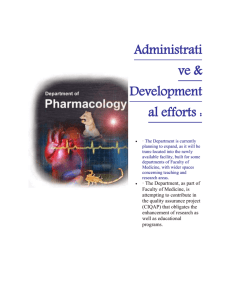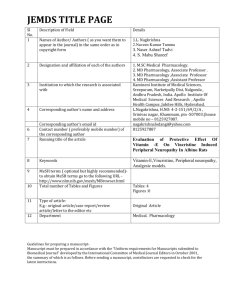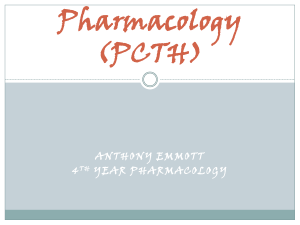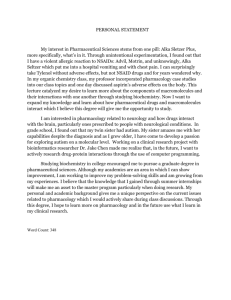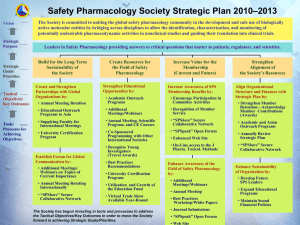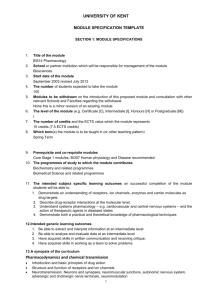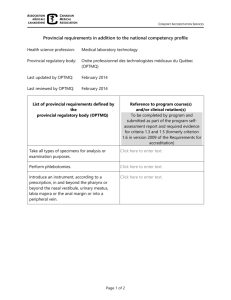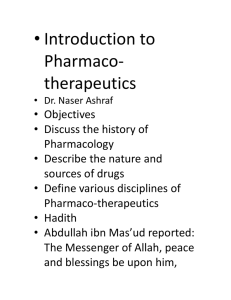BSc Pharmacology
advertisement
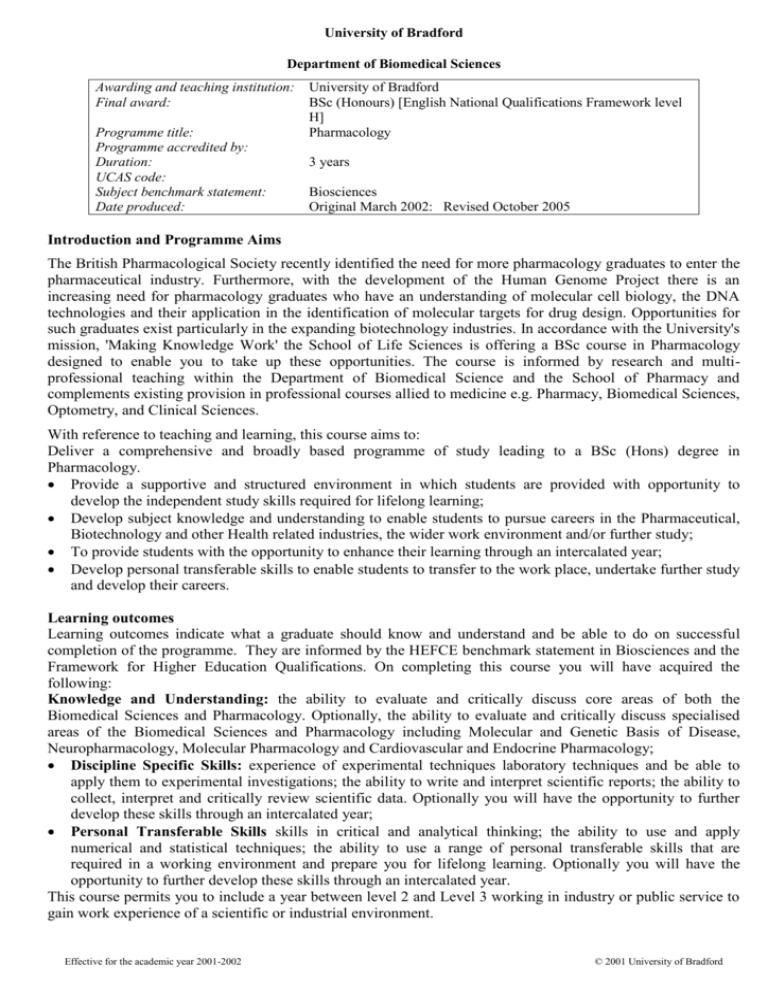
University of Bradford Department of Biomedical Sciences Awarding and teaching institution: Final award: Programme title: Programme accredited by: Duration: UCAS code: Subject benchmark statement: Date produced: University of Bradford BSc (Honours) [English National Qualifications Framework level H] Pharmacology 3 years Biosciences Original March 2002: Revised October 2005 Introduction and Programme Aims The British Pharmacological Society recently identified the need for more pharmacology graduates to enter the pharmaceutical industry. Furthermore, with the development of the Human Genome Project there is an increasing need for pharmacology graduates who have an understanding of molecular cell biology, the DNA technologies and their application in the identification of molecular targets for drug design. Opportunities for such graduates exist particularly in the expanding biotechnology industries. In accordance with the University's mission, 'Making Knowledge Work' the School of Life Sciences is offering a BSc course in Pharmacology designed to enable you to take up these opportunities. The course is informed by research and multiprofessional teaching within the Department of Biomedical Science and the School of Pharmacy and complements existing provision in professional courses allied to medicine e.g. Pharmacy, Biomedical Sciences, Optometry, and Clinical Sciences. With reference to teaching and learning, this course aims to: Deliver a comprehensive and broadly based programme of study leading to a BSc (Hons) degree in Pharmacology. Provide a supportive and structured environment in which students are provided with opportunity to develop the independent study skills required for lifelong learning; Develop subject knowledge and understanding to enable students to pursue careers in the Pharmaceutical, Biotechnology and other Health related industries, the wider work environment and/or further study; To provide students with the opportunity to enhance their learning through an intercalated year; Develop personal transferable skills to enable students to transfer to the work place, undertake further study and develop their careers. Learning outcomes Learning outcomes indicate what a graduate should know and understand and be able to do on successful completion of the programme. They are informed by the HEFCE benchmark statement in Biosciences and the Framework for Higher Education Qualifications. On completing this course you will have acquired the following: Knowledge and Understanding: the ability to evaluate and critically discuss core areas of both the Biomedical Sciences and Pharmacology. Optionally, the ability to evaluate and critically discuss specialised areas of the Biomedical Sciences and Pharmacology including Molecular and Genetic Basis of Disease, Neuropharmacology, Molecular Pharmacology and Cardiovascular and Endocrine Pharmacology; Discipline Specific Skills: experience of experimental techniques laboratory techniques and be able to apply them to experimental investigations; the ability to write and interpret scientific reports; the ability to collect, interpret and critically review scientific data. Optionally you will have the opportunity to further develop these skills through an intercalated year; Personal Transferable Skills skills in critical and analytical thinking; the ability to use and apply numerical and statistical techniques; the ability to use a range of personal transferable skills that are required in a working environment and prepare you for lifelong learning. Optionally you will have the opportunity to further develop these skills through an intercalated year. This course permits you to include a year between level 2 and Level 3 working in industry or public service to gain work experience of a scientific or industrial environment. Effective for the academic year 2001-2002 © 2001 University of Bradford The curriculum The curriculum is designed to provide a broadly based education in the first two-years and offers optional routes of study in third year. At Stage 1 and 2 all modules are core to ensure that you have a good foundation in both the Biomedical Sciences and Pharmacology. At Stage 3, the curriculum allows you to further develop your knowledge of Pharmacology and associated complementary areas of the Biomedical Sciences. A variety of option choices are available to allow specialisation and in-depth study of areas that reflect the research expertise of the school. Critical and analytical skills will be developed throughout the course particularly in the final year research project. Personal transferable skills designed to assist your transfer from University to the working environment or further study are embedded at all levels of the curriculum. The curriculum may change, subject to the University's course approval, monitoring and review procedures, as improvements are made each year. More detail, including learning outcomes is available for each unit. Unit code BM1105L BM2107M BM1113M BM1110M BM1111M BM1108L BM2109M BM2108D BM4101M BM3108L PH2220D BM3110M BM3102M BM3103M BM4107D BM3104D BM4201M BM6126D PH3000D BM5119D BM6122D PH-3237D BM3008KM PH3001D BM6127D BM6123D Unit title Type Credits Level Sem Developing Professional Skills 1 Human Genetics Introduction to Biological Molecules Cells and Tissues Cell Biology Medical Physiology Biochemistry Microbiology Reproductive Biology and Embryology Human Physiology and Pharmacology Introduction to Pharmacological Techniques Developing Professional Skills 2 Clinical Biochemistry Immunology Molecular Genetics and Cell Biology Pathology Analytical Biochemistry Biochemical and Behavioural Pharmacology Neuropharmacology Gene Expression and Cellular Communication Molecular and genetic basis of disease I Critical Evaluation in Pharmacology Research Project Molecular Pharmacology Cardiovascular and Endocrine Pharmacology Molecular and genetic basis of disease II Core Core Core Core Core Core Core Core Core Core Core Core Core Core Core Core Core Core Optional Optional Optional Optional Core Optional Optional Optional 20 10 10 10 10 20 10 20 10 20 20 10 10 10 20 20 10 20 20 20 20 20 40 20 20 20 1 1 1 1 1 1 1 1 1 2 2 2 2 2 2 2 2 3 3 3 3 3 3 3 3 3 1+2 1 1 1 1 1+2 2 2 2 1+2 1 1 1 1 2 2 2 1 1 1 1 1 1+2 2 2 2 At level 3 you can choose one from 4 20 credits in semester 1 and 2 from 3 20 credit modules in semester 2. Assessment regulations: a summary (the full and most recent progression regulations are maintained on the Web) To pass and proceed from each stage to the next, and also to be eligible for a classified Honours award, you must achieve at least 40% in 100 credits and 35% in the other 20 credits. The class and division of the Honours degree that you are awarded is based on the overall weighted marks that you receive for each stage. Stage 2 contributes 30% and stage 3 70%. The classes and divisions of the Honours degree are awarded on the basis of the following minimum final overall weighted average marks: Effective for the academic year 2001-2002 © 2001 University of Bradford 70.0% or above: 60.0% or above: 50.0% or above: Otherwise: First Class Honours Second Class Honours – First Division Second Class Honours – Second Division Third Class Honours If you complete Stage 1 successfully, you are eligible for a Certificate of Higher Education; if you complete stage 2 successfully, you are eligible for a Diploma of Higher Education. The learning outcomes for these awards and the final award are consistent with those of Framework for Higher Education Qualifications. Teaching, learning and assessment strategies The teaching and learning strategy takes into consideration the learning outcomes for the course, progression through levels of study, the nature of topic studied and the need for you to demonstrate greater autonomy in your learning as you progress through the course. Level 1 provides a foundation in the general principles of biomedical sciences and Pharmacology. You will develop your knowledge and understanding of scientific principles, laboratory and study skills. You will begin to analyse and interpret scientific information. At level 2, you will further develop your knowledge, understanding and skills and begin to specialise in your area of study. You will continue to develop autonomy in your learning and take increasing responsibility for achieving learning outcomes. At Level 3, you will study specialised areas in-depth and develop, particularly through the project, research skills and critical and analytical skills. You will also have the opportunity to take responsibility for achieving, group and personal learning outcomes. Personal transferable skills are embedded throughout the course and will be taught, practised and assessed at all levels. Teaching methods consist of lectures to develop knowledge, laboratory classes and project work to develop laboratory and research skills and workshops and case studies to develop research and self-learning skills. The assessment strategy is designed to allow you to demonstrate achievement appropriate to the individual module, level and course learning outcomes consistent with the Framework for Higher Education Qualifications. At stage 1 you will be examined, primarily, on the breadth of knowledge via MCQ and short answer examinations Coursework assignment will give you the opportunity to gain experience in report writing. As you progress through stage 2 and 3 you will have the opportunity to demonstrate increasing skills of analysis, synthesis and criticism through a wide variety of assessment strategies, including essay style examinations, report writing, group work, critical appraisal, case studies, simulation exercises, and dissertations. Coursework and examinations will give you the opportunity to demonstrate written communication skills and competence in the use of IT. Group exercises will develop and assess team-working skills and presentations will develop and assess oral communication skills. Admission requirements We anticipate admitting approximately 20 undergraduates to the degree programme each year. In addition to fulfilling the University's general entrance requirements, you will need to fulfil the Department’s specific requirements, including (if not offered at A level) a dual science award or biology and chemistry, mathematics and preferably, English at GCSE. The usual route for entry onto the degree course is expected to be A-levels, which should include two science subjects, preferably biology and chemistry. The admission criterion is normally 260 points (e.g., BCC). Two AS levels are accepted in place of a third A-level subject. Applications are also welcomed from candidates with qualifications equivalent to or superior to A-Levels, and each is considered on its merits. BTEC candidates should have an overall pass, plus at least four merits in appropriate science subjects gained in the second (final) year. Candidates with an AVCE in science should have at least 260 points via a combination of units. Scottish candidates should normally offer 260 points with at least 80 points in both biology and chemistry, and at least 40 in mathematics. Candidates with a Irish Higher leaving certificate should offer B,B,B,C,C with biology and chemistry at grade B, and mathematics; all passed at one sitting. Applicants with alternative qualifications, and mature students with experience and motivation should contact the Admissions Tutor for details of how prior learning and experience may be used during the Biomedical Sciences admissions process. Effective for the academic year 2001-2002 © 2001 University of Bradford Student support and guidance The university and the departments have well-deserved reputations in this area. You will be allocated a personal tutor in your area of study. You will also be supported in your studies by university and departmental student handbooks and by module study guides. The support provided by the departments is enhanced by a strong university infrastructure, including particularly the Disabilities Office and the Careers Service, and the Library and Computing facilities. Further information If you would like more information about the University of Bradford, please check the undergraduate prospectus. More details about the course can be obtained from the Admissions Tutor of the Biomedical Sciences Department. Effective for the academic year 2001-2002 © 2001 University of Bradford

